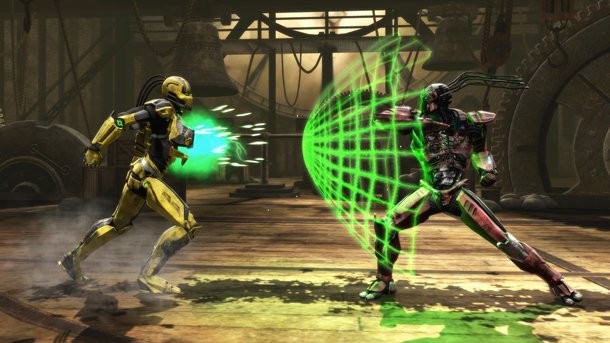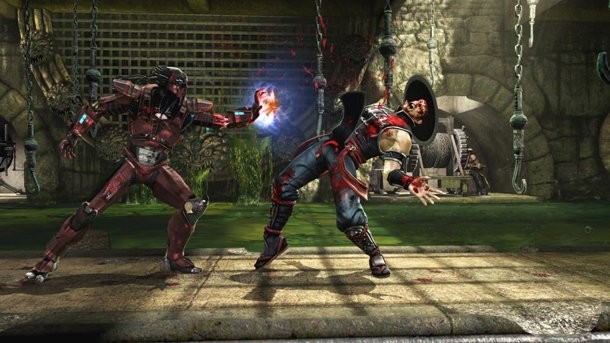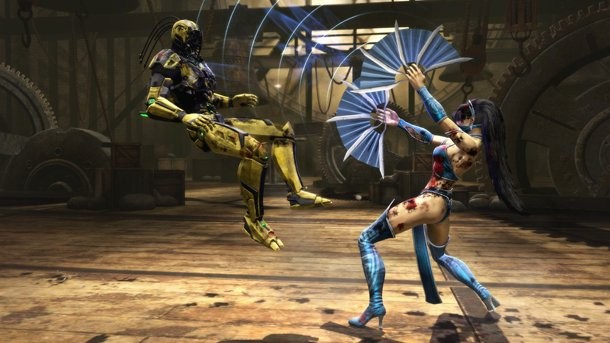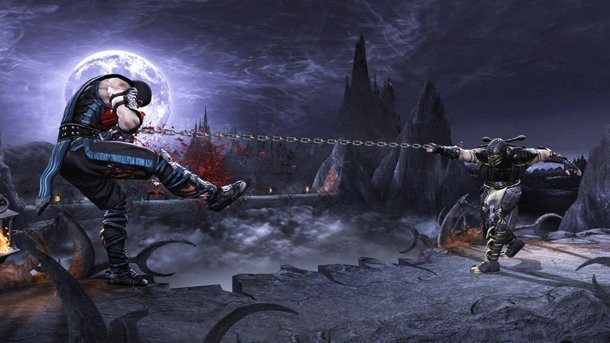A Konversation With Mortal Kombat's Ed Boon

Ed Boon has been a part of Mortal Kombat since the series began. He programmed the first game, back when a team of four could realistically tackle such a project. As creative director for NetherRealm, Boon is charged with overseeing the latest installment in the series, which is simply titled Mortal Kombat.
We sat down with Boon at last week's Gamescom, and talked about his pinball past, the evolution of the series, and how the Internet marked the beginning of the end of gaming secrets.
Game Informer: Now, obviously Wikipedia is the greatest source around for background research and fact-checking. Anyway, on Wikipedia it says you did the voice of Rudy from the pinball game Funhouse. Is that true?
Ed Boon: Yes. Yes it is. They actually gave me one of those just for doing Rudy.
GI: Was that voice all you, or was it electronically enhanced?
Boon: No, it was just me. Back in the day, I did voices for about 10 pinball machines. At the time, if someone else at the company [Williams] needed a voice, they didn’t hire actors at the time. I was just somebody who could do different voices, so they’d say, ‘Oh, come in and do this James Cagney voice.’
GI: Do you miss pinball, particularly the fact that so few tables are being made?
Boon: Yeah, it’s kind of a drag that there’s only one company making them. It would be a shame to see it extinct.
GI: No doubt. So I guess we can talk about Mortal Kombat, too. First off, I know it’s important to the degree that it’s included, but honestly, how important do you think a storyline is to a fighting game?
Boon: You know, in terms of the repetitive back to back, fight fight fight, who’s going to win it, it doesn’t play a big part. But I think that certainly for Mortal Kombat, there’s this other component, which is our ongoing soap opera. The first Mortal Kombat game was the first one that really had a bio for each character, and I think that contributed to peoples’ connection with the characters. To me, it’s like what are the special moves they do, how cool is their costume, and what’s their back story? I don’t think it was the main reason—they played them because they played cool—but those things made more of an emotional bond. And then we extended it so far with full-motion video and actors that it became cinematic.

GI: With the reboot, does it give you a chance to not have to retcon a whole bunch of weird elements and just start fresh?
Boon: To me, we weren’t able to tell—back in ’92, when the first game came out, it was only two or so paragraphs. We didn’t have a medium to tell a detailed story. So we’re really telling the first story, which was never really told in detail. Now we have cinematics and actors and motion capture and all that stuff. Now we can tell it with a lot more sophistication. That’s, to me, the big win of the story.
GI: That was always the tricky part for me as a player. I never completely understood the story of Mortal Kombat. I obviously knew there was a tournament and that Liu Kang was victorious, but beyond that it became really convoluted through the various games.
Boon: Yeah, you’d have to read the comic book we made or read some writeup or explanation that we would do that somebody had and put it together in your head. It wasn’t available in one concise place.
GI: So if you had to do a high-level summary of the Mortal Kombat story, what would you say it would be? What do you need to know?
Boon: I think in Mortal Kombat, as dumb as it sounds, the whole purpose of fighting is that the winner of the fight is representing their realm—Earth realm, Netherrealm, Outworld, you know, all that—and that’s who rules the universe, so to speak. The means of doing it is by beating the s--- out of somebody. [laughs] If that makes any sense. And then when you think about it in the context of the video game, you have to have a reason for these guys to be fighting, so let’s make it this tournament, add a little bit of Enter the Dragon, a little bit of Bloodsport, Star Wars, stuff like that.
GI: Is it weird to think about the cultural significance that Mortal Kombat has had over the years? Did you have an early sense of how big it was going to get?
Boon: When the first movie came out, that was when it really hit. Acclaim had come out, and it sold I think 6 million of the first game and 5 million of the second. You know, really big numbers. We were just working on the next arcade game and we would hear that it was doing well, but were frantically just doing the next version. I think when we went to the actual movie premiere at Mann’s Chinese Theatre and waking up the next morning and seeing on CNN ‘Mortal Kombat’s the second biggest movie opening in August in history, next to A Clear and Present Danger’ or something like that. So they’re comparing it to something that’s really big. That’s when it really hit me. This thing is getting pretty big.
GI: Is online play a decent replacement for arcade test locations, in terms of seeing how games play out in the wild?
Boon: Not for testing, because obviously by the time it gets online the game is complete. I guess it serves the whole thing of playing against people, which is the funnest part of the game. You can play against the computer, and it can be fun, but there’s nothing like playing against a human being. Since arcades don’t offer that anymore, I think online’s the answer to that.
GI: When you release your game and then you hear something like ‘Oh, Liu Kang’s uppercut is unblockable,’ or something like that, is that something you can address relatively easy post release?
Boon: This isn't really something we talk much about, but we've put hooks in the game to let us balance things even after the game is launched. So there are basically global rules with all of the detailed numbers, and we can tweak that even after the game is launched. So if suddenly we find out that somebody's uppercut can be repeated, we can turn this knob down and fix it after the game is out--and it doesn't need a patch or anything.
GI: Does a part of you miss the digitization process and the way that it looked?
Boon: I think that’s a cool look, and certainly with HDTVs now, you could probably make a really nice, really photorealistic game. You’d need a lot of frames of animation to be smooth. But the look that we have now, I’m pretty excited about. It’s 3D, but it looks kind of photorealistic.

GI: Are there any elements of the old-school presentation in the game as throwbacks that fans might recognize?
Boon: Yeah, yeah. Scattered throughout the game are little tributes to things that people remembered. We’ll probably have the ‘Toasty’ guy come out and—because everybody has got their memories of playing it at a Pizza Hut or a 7-11 or something like that, so we really want to hit those nerves.
GI: That’s something that I really miss in games—the social component that arcades have. As fun as playing online is, it just isn’t the same. You can’t see people and think, ‘Oh, it’s that guy…’
Boon: Or, ‘Did you hear that there’s a hidden guy, Reptile, in the game?’ and everybody is kind of buzzing about it. That was, to me, one of the funnest things. We’d stand in an arcade and hear somebody say, ‘I hear you can do this trick,’ and you knew that it was a seed that we planted and then hearing people talk about it later.
GI: I hear you can get people naked…
Boon: Yeah! Nudalities! The lies were the best ones, where everybody made stuff up and perpetuated all the other rumors.
GI: In a way, the Internet has really ruined a lot of that.
Boon: It was great, because it would spread rumors. At the time, a big value was knowing how to do fatalities. People would say, ‘I know how to do Sonya’s fatality, and you don’t, and they would put their coats over their hands while they’d do the motions and stupid things like that. I remember when Mortal Kombat II came out, that was when forums started coming out, people in California were talking to people in Chicago. Once somebody knew Sonya’s fatality in Chicago, you’d hear people in California talking about it. I remember thinking to myself, ‘Well, this is the beginning of the end of the whole secrecy thing.’ It just doesn’t exist anymore.
GI: It’s interesting timing that Street Fighter IV rebooted the Street Fighter series, and then Mortal Kombat is returning back to its roots in a lot of ways. Is that just a coincidence, or was the timing right for some other reasons?
Boon: Our last game, Mortal Kombat vs. DC, had a fighting mechanic that was a little bit more 2D than the previous games. You know, down would duck and up would make you jump. A lot of people said they liked that, so we had already decided that we were going to go full-bore out on the next one. I think Street Fighter came out and basically solidified that. Fighting games in general, I believe, were getting too complicated. They were great, and they were sophisticated, but most people weren’t interested in learning for two weeks before they got good at the game. People just don’t have that kind of attention span. There’s a new-release game every other week, so it’s like, ‘That’s my attention. That’s my attention.’ Nobody really sits on Virtua Fighter or some of the other really hardcore games and says, ‘I’m going to spend a month on this guy.’ It just doesn’t happen much anymore. There are some people who do it, but they’re in the vast minority of the players. I actually like that kind of stuff, but I think the general public wants something a little simpler, and I think that the 2D stuff is a lot more accessible to people. At the same time, we’ve buried a lot of deeper, hardcore fighting-game windows of opportunity for the hardcore players to dig at.
GI: How do you make everybody happy? You’ve got
the instant-gratification people who want to print out the FAQ and do a
fatality, and then you have the serious fighting-game players, too.
Boon: I think you need to make the average player able to do something
cool and big on the screen. To throw a spear, it’s tap, tap, button.
Ninety percent of the world can do that. Then a smaller percentage can
do the quarter-circle fireball thing. And then a smaller percentage can
interrupt the fireball and break out of it and do this. And then a
smaller percentage can interrupt this, interrupt that. I think if you
offer that for all of those levels, so this guy’s having fun because
he’s throwing iceballs, and this guy’s having fun because he’s
interrupting this move and cutting into this move and showing off in
front of people, that’s where you get the big numbers in the millions of
players.
GI: With fatalities, do you feel like you’ve run out of ways to ruin the
human body in unique ways? Is there a collective cheer when you
discover something new?
Boon: When we started the game, we decided we were going to model the
body and then decided we were going to have cuts here, here, here, here,
here—so we gave a graph of a separated body out and said, ‘This is what
we have to work with.’ That’s where people went, ‘OK, he cuts him in
half here, and then cuts his head off, and then he cuts his arm off…’
That was the template that everybody worked from. And we would have
fatality meetings where people would stand up and act out their ideas.
Some people would cross the line, and you’d go back and forth, and
that’s how that works.
GI: Without getting too explicit, what is crossing the line in a Mortal
Kombat game?
Boon: I don’t think there’s a general rule that you can say, but you go
by peoples’ reactions. There would be seven or eight of us in a room,
and somebody would describe something and sometimes most of us would
go…ehhh, no. You’re not going to do anything…I don’t want to even say
them out loud. [laughs]
GI: Does the new Mortal Kombat have some of the silliness of the older
games? Like Jax’s giant foot stomping down?
Boon: I think in every Mortal Kombat game we put a touch of silliness in
it, because we’re not taking it seriously. When we say, ‘Kung Lao cuts
your head off and then cuts you in half and then you split like this,’
we’re not like [mock serious tone] ‘Good job.’ It’s just so ridiculous
that you would do that to somebody, that for us we need to remind
everybody that we’re not being very serious. So we’ll have the ‘Toasty’
guy or have someone turn into a baby, but we’re not going to go crazy
with that. We’re not going to do animalities or friendships or the over
the top humorous stuff, but we are going to have funny elements.
GI: Has your involvement with Mortal Kombat stayed pretty similar throughout the series?
Boon: Yeah. Well, the first game was four guys. I was the one programmer, we had two artists and a sound guy. That was four guys who did the whole game. And now it’s like 100. I don’t have time to program anymore, I don’t have time to write code and all that stuff, but I’m still involved with the design of the game and the look of the game. It’s a bit more of a peripheral influence.
GI: Can you talk to me about Mortal Kombat Nitro?
Boon: Yeah! [Acclaim’s] version of Mortal Kombat for the Super Nintendo didn’t play well at all. It looked cool, but it had the sweat and it played really bad. That was actually a source of contention. They needed our approval to put it out, and I wasn’t going to give it to them, but they had a ship date and everything. I remember the president of Acclaim called me at my house and was giving me a hard time. They shipped the game and it didn’t play well at all, and I’ve always regretted caving in to that. The guys who worked on that started working on what they called the Nitro Version, which let you play as some of the boss guys and they added a lot more blood. I think it might have played faster or something. There’s a cartridge of that somewhere in the world. They wanted to re-release it, but we made Mortal Kombat II, so they had to jump on that.
GI: Are you ultimately glad you’ve gone back to 2D?
Boon: Yeah, I am. I think it’s a dramatic change. I think every game that we do needs to have a big change, a story, a reason for people to care. This is Mortal Kombat 9, for people who are counting. ‘Why would I care about Mortal Kombat 9?’ ‘Well, we’re going back to 2D, it’s an M-rated presentation, it’s got the deeper fighting engine—it’s everything you remember about Mortal Kombat from the early days but in the most sophisticated presentation that today’s graphic engine affords.’
GI: How’s the 3D version on PS3 coming along?
Boon: It’s going great. Sony asked us months ago if we wanted to do it, and they gave us development stuff for it, and we modified our engine to display stuff in 3D. It doesn’t change the gameplay—it’s not like we changed the rules or anything—it’s just the presentation. You see plants hanging that look like they’re in front of you. It feels a lot deeper.
GI: Are there Ed Boon trees in the background still?
Boon: There are trees, but I don’t think I’d call them Ed Boon trees.












